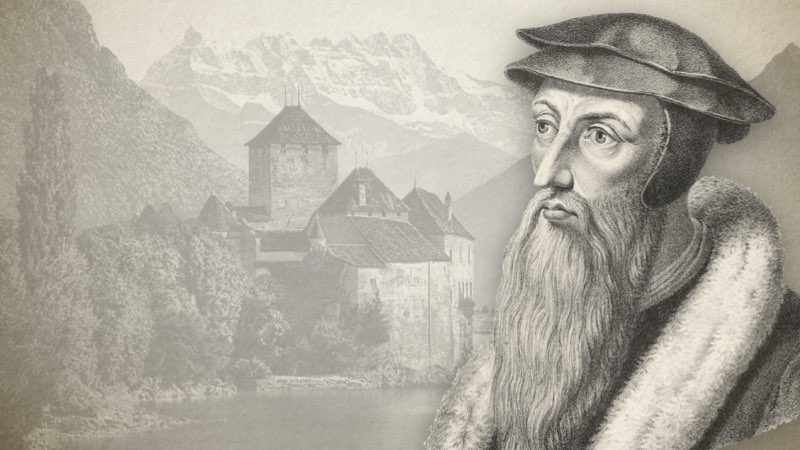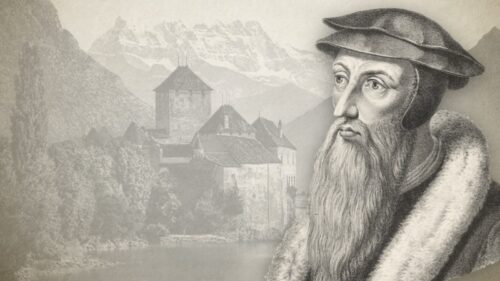John Calvin
John Calvin (1509-1564) was a French pastor, theologian, writer and leading reformer during the Protestant Reformation. His most popular works are his “Institutes Of The Christian Religion” and his commentaries on most books of the Bible. He set forth the absolute sovereignty of God in history and salvation, ascribing all glory to the One with Whom we have to do—the TriUne Jehovah. It is from the teachings of Calvin that the Presbyterian churches emerged. The label which bears his name (“Calvinism”) refers not to all of the teachings he espoused, but rather, to those teachings dealing with the salvation of sinners, otherwise known as the Five Points of Calvinism, or, the Doctrines of Grace.
John Calvin's Institutes Of The Christian Religion, Book 1 (Complete)
John Calvin's Institutes Of The Christian Religion, Book 2 (Complete)
John Calvin's Institutes Of The Christian Religion, Book 3
-
Book 1: Chapter 9, All The Principles Of Piety Subverted By Fanatics, Who Substitute Revelations For Scripture
Sections. 1. The temper and error of the Libertines, who take to themselves the name of spiritual, briefly described. Their refutation. 1. The Apostles and all true Christians have embraced the written Word. This confirmed by a passage in Isaiah; also by the example and words of Paul. 2. The Spirit of Christ seals the doctrine of the written Word on the minds of the godly. 2. Refutation continued. 3. The impositions of Satan cannot be detected without the aid of the written Word. First Objection. The Answer to it. Second Objection from the words of Paul as to the letter and spirit. The Answer, with an explanation of Paul’s meaning. How the Spirit and the written Word are indissolubly connected. 1. Those who, rejecting…
-
Book 1: Chapter 10, In Scripture, The True God Opposed, Exclusively, To All The Gods Of The Heathen
Sections. 1. Explanation of the knowledge of God resumed. God as manifested in Scripture, the same as delineated in his works. 2. The attributes of God as described by Moses, David, and Jeremiah. Explanation of the attributes. Summary. Uses of this knowledge. 3. Scripture, in directing us to the true God, excludes the gods of the heathen, who, however, in some sense, held the unity of God. 1. We formerly observed that the knowledge of God, which, in other respects, is not obscurely exhibited in the frame of the world, and in all the creatures, is more clearly and familiarly explained by the word. It may now be proper to show, that in Scripture the Lord represents himself in the same character in which we…
-
Book 1: Chapter 11, Impiety Of Attributing A Visible Form To God—The Setting Up Of Idols A Defection From The True God
There are three leading divisions in this chapter. The first contains a refutation of those who ascribe a visible form to God (s. 1 and 2), with an answer to the objection of those who, because it is said that God manifested his presence by certain symbols, use it as a defence of their error (s. 3 and 4). Various arguments are afterwards adduced, disposing of the trite objection from Gregory’s expression, that images are the books of the unlearned (s. 5-7). The second division of the chapter relates to the origin of idols or images, and the adoration of them, as approved by the Papists (s. 8-10). Their evasion refuted (s. 11). The third division treats of the use and abuse of images (s.…
-
Book 1: Chapter 12, God Distinguished From Idols, That He May Be The Exclusive Object Of Worship
There are three leading divisions in this chapter. The first contains a refutation of those who ascribe a visible form to God (s. 1 and 2), with an answer to the objection of those who, because it is said that God manifested his presence by certain symbols, use it as a defence of their error (s. 3 and 4). Various arguments are afterwards adduced, disposing of the trite objection from Gregory’s expression, that images are the books of the unlearned (s. 5-7). The second division of the chapter relates to the origin of idols or images, and the adoration of them, as approved by the Papists (s. 8-10). Their evasion refuted (s. 11). The third division treats of the use and abuse of images (s.…
-
Book 1: Chapter 13, The Unity Of The Divine Essence In Three Persons Taught, In Scripture, From The Foundation Of The World
This chapter consists of two parts. The former delivers the orthodox doctrine concerning the Holy Trinity. This occupies from sec. 1-21, and may be divided into four heads; the first, treating of the meaning of Person, including both the term and the thing meant by it, sec. 2-6; the second, proving the deity of the Son, sec. 7-13; the third, the deity of the Holy Spirit, sec. 14 and 15; and the fourth, explaining what is to be held concerning the Holy Trinity. The second part of the chapter refutes certain heresies which have arisen, particularly in our age, in opposition to this orthodox doctrine. This occupies from sec. 21 to the end. Sections. 1. Scripture, in teaching that the essence of God is immense…
-
Book 1: Chapter 14, In The Creation Of The World, And All Things Therein, The True God Distinguished By Certain Marks From Fictitious Gods
In this chapter commences the second part of Book First—viz. the knowledge of man. Certain things premised. I. The creation of the world generally (s. 1 and 2). II. The subject of angels considered (s. 3-13). III. Of bad angels or devils (s. 13-20); and, IV. The practical use to be made of the history of the creation (s. 20-22). Sections. 1. The mere fact of creation should lead us to acknowledge God, but to prevent our falling away to Gentile fictions, God has been pleased to furnish a history of the creation. An impious objection, Why the world was not created sooner? Answer to it. Shrewd saying of an old man. 2. For the same reason, the world was created, not in an instant,…


